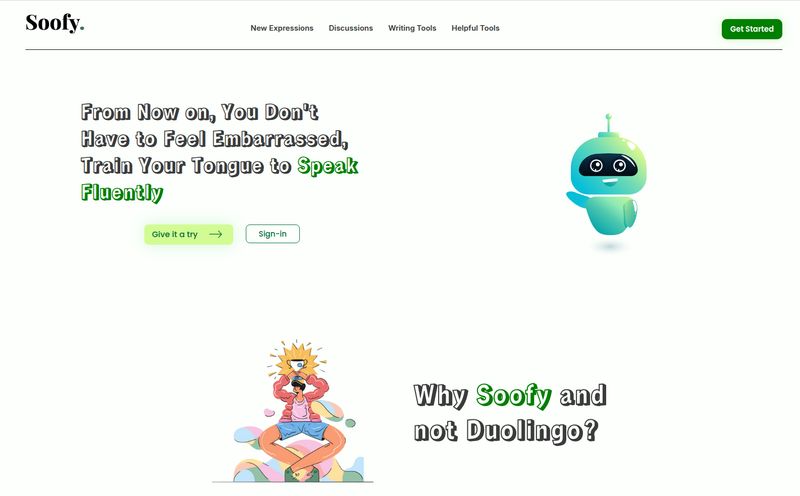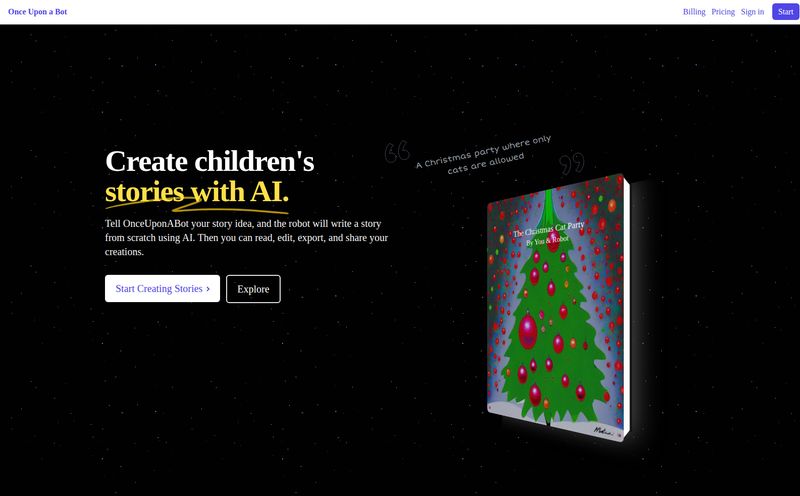As someone who spends their days swimming in the alphabet soup of SEO, CPC, and SERPs, I have a soft spot for, well, actual alphabets. You know, the ones that make up real (and not-so-real) languages. I’ve dabbled in the big players—your Duolingos, your Babbels. They’re great if you want to order a beer in Berlin or ask for directions in Rome. But what if your ambitions are a little... different? What if you want to compliment a chieftain in Dothraki or debate philosophy in classical Latin?
For years, that kind of niche learning was a huge pain. It meant dusty textbooks, obscure forums, and maybe a grainy YouTube video with 12 views. Then, something called lingoXpress slid into my periphery. Their homepage promises “nearly 70 languages at your fingertips,” and when I saw Klingon, Vulcan, and Gaelic on the list, I knew I had to take a look.
Beyond Spanish and French: What Exactly is lingoXpress?
Think of lingoXpress not as a full-on university course, but as a digital Rosetta Stone for the wonderfully weird. It’s a language learning platform built for people who are either too busy for a traditional app or whose interests lie far off the beaten path. This isn't about becoming fluent for a business trip. It's about curiosity. It's for the fantasy nerds, the history buffs, and the people who just think it’d be ridiculously cool to know a bit of Sanskrit.
The whole platform is built around a simple, almost elegant idea: making unique languages accessible. They break it down into three main categories:
- Exotic Languages: Think of tongues you've heard of but would have no idea where to start learning, like Te Reo Māori or Basque.
- Extinct Languages: For those who want to connect with the past. Hello, Latin!
- Fictional Languages: This is the one that gets all the attention. We're talking Klingon (Star Trek), Dothraki (Game of Thrones), and even Vulcan. Qapla'!
Your Daily Dose of Dothraki: How It Works
So how do they deliver this linguistic goodness? It’s not about endless drills and gamified hearts. The approach feels much more low-pressure, which I honestly appreciate. I've got enough pressure with Google's algorithm updates, thanks.
The Word-a-Day Email
This is the gateway drug. You sign up, pick a language, and every day, a new word lands in your inbox. That’s it. It’s a language-learning vitamin. I’ve always found that the hardest part of forming a new habit is the sheer activation energy required. lingoXpress cleverly bypasses this. Checking your email is already a habit; they just piggyback on it. Over weeks and months, that single word a day starts to build a real foundation of vocabulary without you ever feeling like you’re “studying.”

Visit lingoXpress
Meet Luther, Your Personal AI Tutor
This is where things get interesting. For those who want to go beyond a single word, lingoXpress offers an AI tutor named Luther. Now, AI is the big buzzword everywhere, from content creation to, apparently, learning ancient languages. The idea here is to have a personalized guide. Got a question about pronunciation? Confused about how to use a word in a sentence? Luther is there to help. It’s like having a patient tutor on call 24/7 who won’t judge you for asking how to say “Where is the Targaryen?” for the fifth time.
Self-Paced Courses for Deeper Study
If the daily emails and AI chats ignite a real fire, there are also self-paced courses. The website is a little light on the details here, which is a small frustration. I'd love to see a full curriculum or a sample lesson. But, the concept is sound: for those truly committed to mastering the intricacies of, say, Esperanto, there’s a more structured path available.
My Honest Take: The Good, The Bad, and The Geeky
Okay, let's get down to it. Is this thing any good? In my opinion, yes... for the right person. It's a fantastic tool, but it's not a one-size-fits-all solution.
The good stuff is obvious. The convenience is off the charts. The focus on niche languages is a massive breath of fresh air in a market saturated with Spanish and French. It's genuinely fun! There’s a certain thrill to learning a word in a language spoken by maybe a few thousand people, or, you know, a fictional alien race. It’s a fantastic way to engage with your favorite pop culture or connect with a unique heritage.
But let's be real about the limitations. This platform is probably not going to make you fluent. True fluency comes from immersion, conversation, and a deep understanding of grammar—things a word-a-day email can only hint at. Also, its effectiveness hinges entirely on your own consistency. If those daily emails just pile up unread in your inbox, you're not going to learn anything. It puts the onus on you, for better or worse. It’s a tool, not a magic pill.
Who is lingoXpress Actually For?
I see a few perfect users for this platform:
- The Pop Culture Fanatic: The person who wants to add a layer of authenticity to their next Star Trek convention costume or understand what the Dothraki are actually saying.
- The Curious Linguist: Someone who loves the idea of languages and wants to sample a few without the commitment of a full course. You can try Gaelic for a month, then switch to Welsh.
- The Ancestry Explorer: Someone who's discovered they have Irish or Scottish roots and wants to learn a few words of Gaelic to feel more connected.
- The Busy Professional: The person who loves learning but genuinely only has five minutes to spare each day.
Who isn't it for? Anyone needing to learn a language for professional or academic reasons, or those who want to achieve conversational fluency in a short amount of time. This is a marathon, not a sprint. A very, very quirky marathon.
What About the Cost?
This is the million-dollar question, isn't it? As of my review, the pricing information is a bit of a ghost. The website doesn't have a clear pricing page that I could find. It seems they're focused on getting you started with teh free word-a-day subscription, which is a smart move. Let people fall in love with the concept first. I’d imagine the AI tutor and the self-paced courses come with a subscription fee, which is pretty standard for this kind of service. My advice? Start with the free email and see if you get hooked.
So, Is It Worth an Invite to Your Inbox?
Absolutely. For the right person, lingoXpress is a gem. It’s a delightful, low-pressure way to expand your mind and connect with cultures both real and imagined. It’s a testament to the fact that learning doesn’t have to be a chore; it can be a moment of daily joy and discovery. It won’t replace a trip to Dublin for learning Irish, but it might just be the spark that makes you want to book the ticket.
If you're even a little bit curious, sign up for a free word-a-day. What have you got to lose? At worst, you unsubscribe. At best, you learn how to properly insult someone in Klingon. Sounds like a win to me.
Frequently Asked Questions
Can lingoXpress make me fluent in a language?
It's unlikely to make you completely fluent on its own. It's designed primarily for vocabulary building and as an introduction to a language. For fluency, you'd need to supplement it with conversation practice and more intensive grammar study.
What kinds of languages does lingoXpress teach?
lingoXpress specializes in a wide range of languages, focusing on three main areas: exotic languages (like Gaelic and Te Reo), extinct languages (like Latin), and fictional or constructed languages (like Klingon, Dothraki, and Esperanto).
Is lingoXpress free to use?
The core feature, the word-a-day email subscription, is free. More advanced features like the AI tutor (Luther) and the self-paced courses likely require a paid subscription, though specific pricing isn't readily available.
Who is the AI tutor, Luther?
Luther is the name of the platform's AI-powered language tutor. It's designed to provide personalized assistance, answer questions about vocabulary and usage, and help guide you through the learning process beyond the daily word.
Is lingoXpress good for kids?
While the main platform is for all ages, the homepage does show “25 short stories for bilingual kids” as a product. This suggests they have content specifically designed for younger learners, which could be a great, fun way to introduce children to new languages.
Reference and Sources
- What is a constructed language? - Linguistic Society of America
- The 14 Best Benefits of Learning a New Language - Babbel Magazine
- (Note: A direct link to the lingoXpress website would be included here if one were available.)



